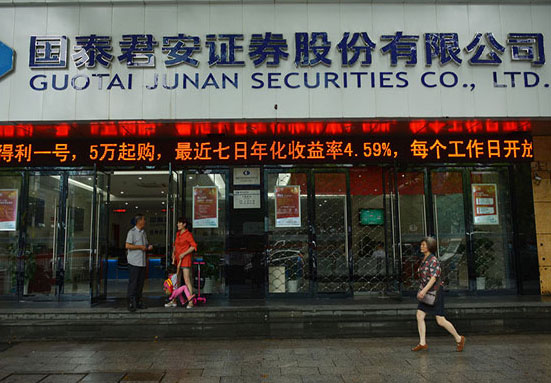

BEIJING - China's state-dominated oil sector has started to make efforts to woo private capital amid a growth slowdown in the world's second-largest economy.
The China National Petroleum Corporation (CNPC), a state-owned oil giant, on Wednesday signed an investment framework agreement with investors, including the National Council for Social Security Fund (NCSSF), Urban Infrastructure Construction Investment Fund (UICIF) and Baosteel Group Corporation, to jointly develop China's third west-east natural gas transmission project.
According to the agreement, a joint venture will be set up to run the 116-billion-yuan (18 billion U.S. dollars) project, with the CNPC holding a 52-percent stake, and the NCSSF, the UICIF and Baosteel holding 16-percent stakes, respectively.
The NCSSF, which manages the country's social security funds, was launched in 2000 to serve as a coffer for social security expenditures, while the UICIF, initiated by the All-China Federation of Industry and Commerce, is a platform for private investors to invest in the energy and infrastructure sectors.
The move, which marks the largest-ever investment project in terms of the scale of the social capital involved, is also the first time for China to use both national and private funds for a single national project with equal terms and treatment.
"The move is undoubtedly an important step toward fully opening to social capital," said Feng Fei, head of the industrial economy department at the Development Research Center under the State Council, or China's cabinet.
Feng said the country's petroleum industry has been a hard-to-reach area for social capital, which has prompted strong demands for the admittance of private and national funds.
The move came after several state-run sectors, including the railway and financial sectors, opened their gates to private capital following a recent State Council meeting that vowed to support private investment in monopolized sectors.
"The new investment and fundraising method is a significant innovation in the formation of capital and prices. This is what the current economic situation urgently needs," said Dai Xianglong, chairman of the NCSSF.
With first-quarter GDP growth hitting a three-year low of 8.1 percent, China's economy is expected to head further downward, as April's key economic data, including industrial production, exports and retail sales, showed signs of slowed growth.
The investment will bring the advantages of all parties into full play and allow for the effective allocation of market resources, which will serve the country's efforts to expand domestic demand and boost growth, said CNPC general manager Jiang Jiemin.
The project has also attracted private wealth management funds raised by the Industrial and Commercial Bank of China, the country's largest bank by market value.
But the high-profile participation of social capital has also triggered worries about possible risks.
"A long-term mechanism should be built to substantially protect the investors," Feng suggested.
Composed of eight sub-pipelines and one major pipeline, the third west-east pipeline project will begin in west China's Xinjiang Uygur autonomous region and reach Fujian province in the southeast.
With its 5,000-km trunk line traversing 10 Chinese regions, the project is expected to transport than 30 billion cubic meters of natural gas annually after its completion in 2015.
The CNPC was the contractor for the first west-east pipeline, which pipes gas from the Tarim Basin of Xinjiang to Shanghai, as well as the second west-east pipeline, which runs from Turkmenistan and northwest Xinjiang to the Yangtze and Pearl River deltas.
 Fishermen who clean enteromorpha
Fishermen who clean enteromorpha
 Govt Carries out conservation program in Tibet
Govt Carries out conservation program in Tibet
 Business giants celebrate the success of entrepreneurship
Business giants celebrate the success of entrepreneurship
 Top 10 Chinese businesswomen in 2015
Top 10 Chinese businesswomen in 2015
 Female robot sings in Shanghai
Female robot sings in Shanghai
 21st Lanzhou Investment and Trade Fair kicks off in Lanzhou
21st Lanzhou Investment and Trade Fair kicks off in Lanzhou
 Top 10 Chinese brokerage firms in H1 of 2015
Top 10 Chinese brokerage firms in H1 of 2015
 Fancy sculptures sparkle in Chongqing
Fancy sculptures sparkle in Chongqing